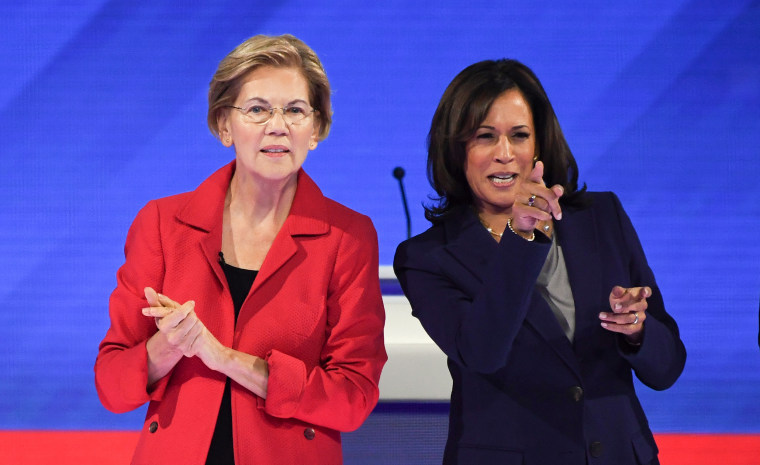Sen. Elizabeth Warren, D-Mass., threw massive shade at Vice President Kamala Harris when she refused to endorse her as President Joe Biden’s future running mate as he gears up for a likely re-election bid.
Or at least that’s the message Republicans and right-wing media are trying to push after Warren’s interview with public radio station WGBH on Friday. In reality, Warren was doing something less juicy than trying to take a swing at Harris. She was most likely trying to not box Biden in given that presidents do, on rare occasion, pick new vice presidential candidates when running for re-election.
Mostly, it looks like Warren was acting diplomatically.
During the interview, Warren was asked if Biden should run again for president, which is fast emerging as the expected reality in Washington. Warren said he should because he’s “gotten a tremendous amount done.” When asked if Harris should be his choice for vice president, Warren replied:
I really want to defer to what makes Biden comfortable on his team. I’ve known Kamala for a long time. I like Kamala. I knew her back when she was an attorney general and I was still teaching and we worked on the housing crisis together, so we go way back. But they need — they have to be a team, and my sense is they are — I don’t mean that by suggesting I think there are any problems. I think they are.
For critics and beltway analysts looking to extract maximum drama from any intra-Democratic Party exchange, Warren’s decision to decline to endorse Harris was a condemnation. Despite the fact that Warren even issued a clarifying statement after the interview saying that she “fully support[s] the President’s and Vice President’s re-election together,” Fox News held an entire panel over Warren’s statement based on the assumption that Warren had accidentally revealed her animosity and competitive attitude toward Harris.
But mostly it looks like Warren was acting diplomatically — and in accordance with the theoretical possibility that Biden could replace Harris with someone else on his ticket. Biden has said that if he runs again, Harris will be his vice presidential candidate, but that doesn’t eliminate the small possibility that he could be privately considering his options.
It’s rare, but presidents have switched up vice presidents as they’ve angled for extra terms in the White House. For example, Franklin Roosevelt dropped one of his vice presidents, Henry Wallace, because of Wallace’s rivalries within Roosevelt’s Cabinet and Democratic leaders’ objections to him. Abraham Lincoln fatefully picked Democratic Sen. Andrew Johnson to replace his vice president because he wanted to clinch Southern support and project unity as he sought re-election amid the Civil War.
Sometimes presidents look at vice presidents as a way to bring life to unpromising candidacies. The Obama administration reportedly considered dropping Biden from Barack Obama’s ticket for 2012, and replacing him with Hillary Clinton, as it desperately sought a way to revive his terrible approval ratings.
It’s not inconceivable that Biden could be considering other vice presidential candidates. He and Harris have reportedly butted heads over her policy portfolio, and Harris has fared exceptionally poorly in terms of approval ratings. He’s also already the oldest president to have ever served; if he doesn’t believe Harris is the future of the party that he wants, this could be a major, history-altering opportunity to pass the baton to somebody else.
Now, it is possible that Warren could’ve been a bit more enthusiastic or full-throated in her support for what Harris has accomplished as vice president. But nothing in her comments suggests disapproval. Rather, she wanted to delegate the question entirely to Biden. That's more of a sign of her trust in Biden than distrust in Harris.

